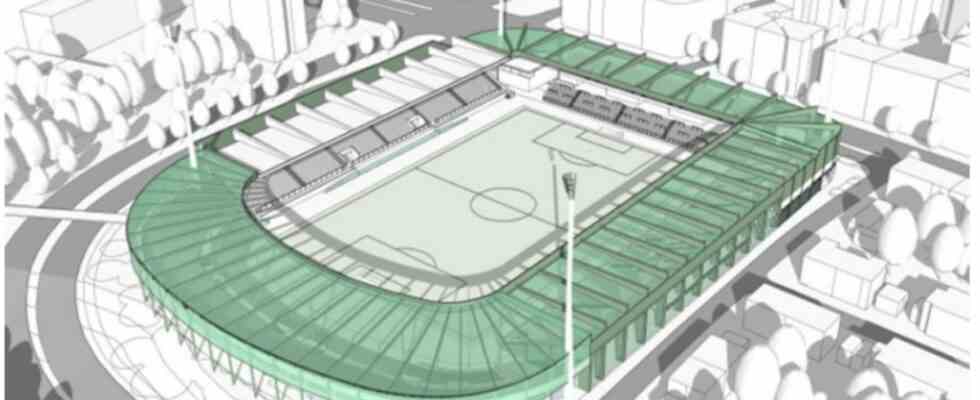The fact that the insolvent football club Türkgücü Munich has just stopped playing in the third division also has its good side: the residents of the municipal stadium on Grünwalder Straße have more peace from now on. In the longer term, fan noise pollution could decrease even further – if the city council approves the arena’s redevelopment plan to the extent that is likely to be submitted to it in the near future.
This Wednesday, the sports committee is dealing with a template that outlines four different construction variants. It is becoming apparent that a majority will follow the recommendation of the city experts and will then propose the most expensive solution to the General Assembly: upgrading the stadium for around 77 million euros. That’s a lot of money for the fact that after Türkgücü’s withdrawal only two clubs want to use the stadium: the third division club TSV 1860 and FC Bayern with its regional league team.
A roof over all grandstands serves best to protect residents
They would then get a playground suitable for the second division. The capacity is to be increased from 15,000 spectators to 18,105 and a new, longer grandstand is to be installed, including VIP areas. Above all, all visitor places should be covered and the corners of the stadium closed.
“A roof over all stands is best for resident protection,” explained Detlev Langer, head of the building construction department in the building department, on Monday evening at a digital hearing by the Giesinger district committees. If, in addition to fans, speaker and floodlight systems are also housed under the roof, noise and light emissions inside the stadium can be contained, says Langer. That was the wish of many citizens.
The third mayor responsible for sport, Verena Dietl (SPD), admittedly confirmed at the hearing: “We will only build the stadium if we have a written declaration of intent from the clubs that they will stay in it.” The meeting draft speaks of a “clear commitment to long-term gaming operations” as a condition for an investment; In addition, a “binding commitment to pay standard market fees (including operating and ancillary costs) for the use of professional sports”.
Not yet completely roofed and therefore a nuisance for some neighbors during the games: the Grünwalder stadium.
(Photo: Sonja Marzoner)
After the lions of TSV 1860 had moaned for a long time because the stadium rent was already too high for them, they have now signaled a willingness to compromise. The project, which has been under discussion for three years, could thus gain momentum. Despite all the risks that sport entails, the CSU parliamentary group sees no reason not to tackle it. “We currently have the unique opportunity to make the stadium fit for the future,” it says on request: “We are aware that such a solution requires money.”
Even the left would not stand in the way of the most expensive solution, as their city councilor Thomas Lechner explains: “If you approach it half-share, you have to do it again after ten years. But if you do it right once, you have a chance that it lasts forty years.” He also sees the Grünwalder stadium as a symbol of social cohesion, precisely because of the commitment of the Löwen fans against the right: “If you also see the stadium in this context, you can spend so much money.”
Cautious tones can only be heard from the Greens. “We also have to think economically,” says Beppo Brem; 77 million euros are “already a big number” in these times. For the Greens, approval of the draft resolution is not yet a foregone conclusion. Especially since the stadium primarily benefits TSV 1860, which experience shows is fickle.
Not too long ago, investor Hasan Ismaik wanted to build his own stadium; now the club is skimping on rent. How the city wants to refinance a 77 million euro investment under these circumstances is a mystery. Even if the stadium lasted for forty years, it would have to generate around 1.9 million euros in revenue every year.
A market rent does not necessarily make it possible to amortize the costs
Because the clubs can contribute little to refinancing, a “market rent” is favoured; based on what league competitors pay, not what is needed for amortization. Exact figures will only be discussed on Wednesday in the non-public part of the meeting. “The city council ultimately has to decide on the rental issue,” says Mayor Dietl. Once this hurdle has been cleared, concrete plans can be made.
Is the cost plan still up-to-date when construction begins? No construction workers will arrive at the stadium on Grünwalder Strasse before the summer of 2026. Only then will the Olympic Stadium be renovated, which the city can offer as the only alternative venue for the kickers.
So there are still unanswered questions, but Jürgen Sonneck, head of the sports office, made one thing clear on Monday evening: “The upgrade will make the stadium suitable for the second division. The first division is unrealistic there.” Even the lion-loving sports mayor Verena Dietl cannot help. “If 1860 are promoted to the Bundesliga,” she said, “we’ll have a completely different issue.”

